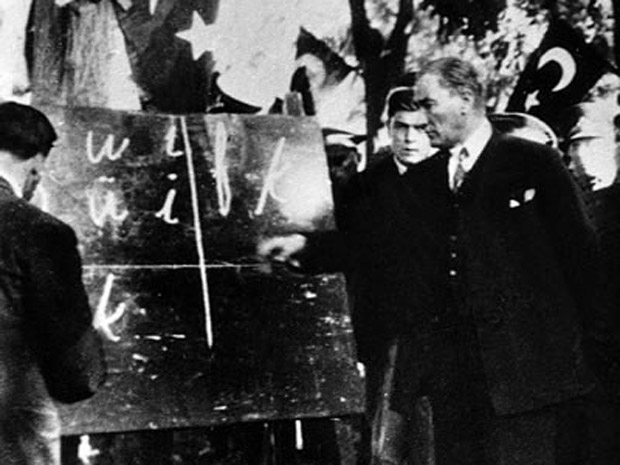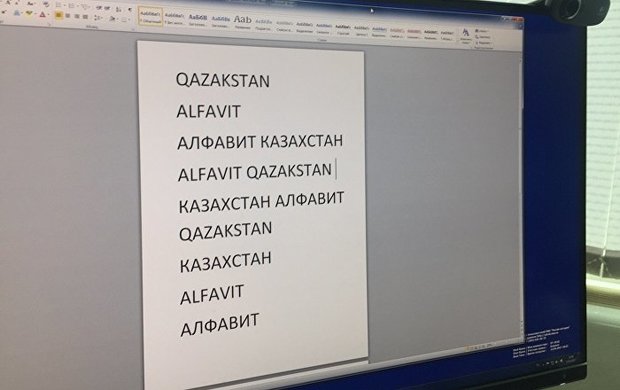''For Tatars and Kazakhs a switch to Latin alphabet is not important when they have socio-economic problems''
Diplomat and Orientalist Yulduz Khaliullin tells about the initiative of President of Kazakhstan Nazarbayev to abandon the Cyrillic alphabet and about the Latin alphabet for the Turkic peoples
The initiative of Kazakhstan's President Nursultan Nazarbayev on the country's shift from Cyrillic to Latin alphabet has been accepted in Russia in different ways. Russian diplomat and Orientalist Yulduz Khaliullin expressed his opinion about appropriateness of a Kazakhstani scenario in Tatarstan and development of the Turkic languages on the basis of different alphabets.
Nazarbayev is not Atatürk
If about a switch of the alphabet it is being spoken by the mouth of the president, to some extent, we are talking about political motivation since it occurs on the eve of the election. But, maybe, they are not related things. Perhaps, we are talking about Turkic consolidation. But in order to raise these issues, there should be a convincing concept, which I have not noticed. To some extent, the switch of the alphabet in Kazakhstan will alienate it from Russia. It will happen in 10-20 years, though maybe they'll change their mind.
As for the history of the transition from the Arabic script to the Latin alphabet, first we should refer to the reforms of the great Turkish revolutionary and thinker, Mustafa Kemal Atatürk. It was almost 100 years ago. There was a motivation to replace very complex Arabic script with Latin, to facilitate education for young generation of the Turks. The task was really progressive and positive. Turkey achieved this. After them, the Azerbaijanis also switched the alphabet to Latin.

Difficulties of translation, or Where to get Arabic technical terminology from?
I see that the Arabic script is quite difficult. I have learnt it and know it, I learnt Urdu also in Arabic. But as far as I know, the Arabic language has no modern scientific terminology. That is why people from wealthy Arab countries go for higher technical and technological education to the United States and Western Europe.
By and large, the Tatar language and other Turkic languages also have no modern scientific terminology. That is, the Tatars and representatives of other nations can get modern technological education in Russia only in Russian. Almost 90% of technical education in the universities of Kazan is given in Russian. The same situation is in Kazakhstan and Kyrgyzstan (which is also making an attempt to change the alphabet) — their higher education is also in Russian. I would like to draw attention to it. At the same time, modern technical terminology is being depleted in the Russian language as well — everything is switching to English.
Turkic consolidation?
If to talk about consolidation, we need to help the Turkic peoples to maintain their culture and language. If the Tatars start to support and maintain the culture of small Turkic peoples, it will be recorded in the annals of the history.
It will be difficult for the Kazakhs. They will switch to Latin, do they really think that it will give them a Turkic consolidation? It is a mistake to think that if one reads in Kazakh in Latin script and they will immediately be able to understand Turkish without the knowledge of the language. It will lead only to confusion. A transition to the Latin alphabet won't solve anything without knowledge of a language.
''They will switch to Latin, do they really think that it will give them a Turkic consolidation? It is a mistake to think that if one reads in Kazakh in Latin script and they will immediately be able to understand Turkish without the knowledge of the language. It will lead only to confusion.'' Photo: yk-news.kz
For the Tatars as well as for the Kazakhs, a transition to the Latin alphabet is not important when they have complicated socio-economic problems. In general, in my opinion, the modern Tatar elite should speak fluently and know three languages: Tatar, Russian, English. From the point of view of development, it is even better to know other languages. President of Kazakhstan Nazarbayev or various Tatar political figures start speaking their native language but when complicated issues are raised they quickly switch to Russian.
''The most important thing is a detachment from the Russian language, and hence deterioration of speaking it by the Tatars''
In connection with the question raised in Kazakhstan, there may revive supporters of a transition to the Latin alphabet in Kazan as well. Now they are silent. But 25 years ago during the collapse of the Soviet Union in Tatarstan there were a lot of publications. In socio-political circles, there was an active discussion of a transition to the Latin alphabet.
Then we with an academician Robert Nigmatullin openly opposed this formulation of the question. Our motive: this transition would cause difficulties of fast understanding of information, and in the future — isolation from the archival data on the Russian Cyrillic alphabet for connoisseurs of 30-50 years. But the most important is a detachment from the Russian language, and hence the deterioration of speaking it by the Tatars.
Besides, a transition to the Latin alphabet will isolate from that part of the Tatar language which is written in Cyrillic and Arabic. After many discussions, the Tatars understood it.

''People should know your native language regardless of alphabet. But now people have no desire for knowledge — that's the problem.'' Photo: sputniknews.kz
The problem is not an alphabet
People should know their native language regardless of alphabet. But now people have no desire for knowledge — that's the problem. There must be socio-political motivation. We can open schools in Kazan and to train people in three languages, it will contribute to the development.
I think of my mother in our little village, where there was imam and poet Daut Gubaidi, he had four classes of education, but he could passably read and write in three alphabets — Arabic, Latin and Cyrillic. Because Daut Gubaidi started to teach the Russian language in pre-revolutionary period.
In order to thoroughly know the languages, we do not need to change alphabets frequently. I think in the next 10-20 years this transition is not expected. Again, if you don't know English, the knowledge of letters will not help you on the Internet, where 70-80% of the information is in English. For this reason, the Chinese do not abandon their characters and develop the Internet in Chinese.